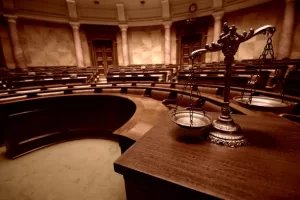One of the most common questions that I receive from clients is, “do I need to show up for my court appearance or hearing?” To a person not involved in a legal matter, this might seem like a silly question, the thinking being, that if one has a court hearing scheduled, then of course they should show up. However, there are a couple of scenarios where the question is actually more logical than it might at first seem.
The first situation in which I encounter this question is in civil suits, typically those involving debt collection, in which the defendant (my client, or a defendant who is merely seeking my advice) is certain that they are going to lose. A common scenario is where an individual incurred a debt at some point in the past, then over the course of time, they became unable to pay the debt, and the collector eventually sued them. The defendant knows that they owe the money, they know that the collector has adequate records to prove it, and they are sure that they will lose the case. Another, similar situation in which this question arises is in eviction hearings, under largely the same circumstances.
In these situations, whether or not the defendant is represented by an attorney, it is always best to show up. It is true that, in the vast majority of these types of cases, the defendants lose, and the plaintiffs (whether they be landlords or debt collectors of some sort) typically win. However, there are still several good reasons why a defendant should show up. First, having received a summons, they are under an order of the court, which means that the court is mandating that they appear. Failure to do so is, in fact, disobeying a court order. Second, showing up may allow the defendant to work out a deal with the plaintiff, and possibly have the case settled, or dismissed outright. Finally, showing up allows the defendant to be heard, and state his or her case before the judge. Even if a defendant thinks their case is lost before the hearing even starts, it’s still a good idea to show up and, if a deal can’t be worked out with the plaintiff, fight the good fight and present all evidence to the judge. That way, the defendant puts themselves in a position to at least get the best possible outcome in a loss, or perhaps even win the case, if their evidence and arguments are strong enough.
The second situation where I often encounter this question is in the criminal context, and usually dealing with misdemeanors or low-level felonies. The thinking of defendants goes something like this: defendant has been charged with a low-level crime; he or she hires an attorney to handle the matter; the attorney takes care of all the paperwork, communicates with the opposing party, communicates with court staff, etc.; the defendant begins to see that he or she does not need to be involved in most of what’s going on; the defendant, who has a hearing or appearance coming up, wonders if he or she can just skip it, and let the lawyer handle it. This is a particularly pressing question for defendants who have some experience with the court system, or who have already had a hearing or two on their case, and have witnessed how quick, boring, and inconsequential many hearings can be. A defendant, after having taken off time from work, driven down to the courthouse, paid for parking, gone through security checks, and waited to be let into court, will often find his or her “hearing” lasting only a couple of minutes, and largely consisting of the defense attorney saying a few words to the prosecutor, and collecting a few documents. It is reasonable for a defendant in this situation to wonder if they even needed to show up.
However, as in the civil lawsuit situation mentioned above, it is likewise imperative for defendants to show up for all criminal hearings as well, even for low-level crimes, and even for seemingly inconsequential hearings. First, as in the civil context, the defendant has been ordered to the court, and is therefore under a legal duty to appear. In many instances, if a defendant does not appear, a warrant may be issued for their arrest. This fact alone should be enough to prompt defendants to appear for all matters. Second, the defendant’s attorney will often want them to be there, so that the attorney can immediately bounce ideas and information off of them – for example, if the prosecutor offers a plea deal that the attorney thinks is attractive. It is better for the defendant to be there to discuss and give input on the matter immediately, while all parties are present. Third, there may be minor details pertaining to the case that the attorney is not aware of, and only the defendant will know. Finally, although many pre-trial hearings are settled between attorneys and don’t actually go before a judge, an actual appearance before a judge always remains a possibility, and defendants must be on hand in case this is required.
In real life, things to happen: people get sick, car accidents occur, other mishaps take place. Sometimes a defendant truly is not able to make it to court. In those instances, the defendant should contact their attorney immediately, so that the attorney can either continue the hearing, or advise all parties of the defendant’s absence and move forward accordingly. If the defendant is not represented, they should contact the court staff immediately. However, if the defendant is at all able to be in attendance, they should be present for all hearings to which they are ordered. Failing to do so could result in an angry judge, an arrest warrant, or even a judgment against the defendant.
Contact us if you have any additional questions or need assistance with a legal matter.
NOTE
This article primarily references Indiana law. Please check the laws of your local jurisdiction if you live in another state.
The articles in this blog are for informational purposes only. No attorney-client relationship is established through the publication of these articles.







